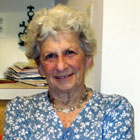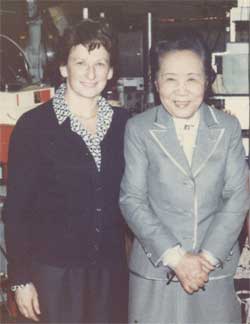Noemie Koller Receives APS Nicholson Medal for Human Outreach
Herman Winick

"For unselfish commitment to advocating the freedom of scientists around the world and for leadership in fostering equal opportunities for women in science."
On the website http://www.aps.org/programs/honors/awards/nicholson.cfm you can see the previous winners of this prestigious award and some background on Noemie’s outstanding research and outreach activities. Remarkably she has engaged in so many outreach activities along with an extremely active career in teaching and nuclear physics research, authoring or coauthoring more than 100 refereed journal articles

Noemie Koller and Chien-Shiung Wu
Noemie’s career in physics was strongly shaped by her thesis advisor at Columbia University, Chien-Shiung Wu, who was described by T. D. Lee as “one of the giants of physics. In the field of beta-decay, she had no equal.” Wu was known for her extraordinary work ethic and her devotion and attention to her students. In a talk “Personal Memories of Chien-Shiung Wu” at the April 1997 APS meeting Noemie referred to Wu as “a unique scientist, a very special human being and a friend”. Her warm tribute to her mentor became an article in the July 1997 issue of the newsletter of the APS Forum on Physics and Society. I recommend it to all. See: http://www.aps.org/units/fps/newsletters/1997/july/index.html.
Noemie is clearly a worthy disciple of her mentor. Highlights of her career have been briefly summarized in a sketch by Paul Leath:
“Noemie Benczer Koller was born in Vienna, Austria on August 21, 1933. She received her B.A. Degree from Barnard College in 1953, and her M.S. (1955) and Ph.D. (1958) Degree in experimental physics from Columbia University, New York, NY, where she continued as a postdoctoral research associate until 1960.
She joined the Rutgers Physics Department in the fall of 1960 as an assistant professor, and was the first- female assistant professor appointed to the faculty of Rutgers College, which then had an all-male student body. She received tenure in 1965, and thus also became the first woman ever to be promoted to tenure in the faculty of Rutgers College. At Rutgers she was a major member of the nuclear physics research group working on the tandem Van de Graaff accelerator, as well as an important condensed-matter physicist, performing experiments using the Mossbauer effect. She was later the Director of the Nuclear Physics Laboratory (1986-89).
She also served in the administration of the University as the Associate Dean for Sciences of the Faculty of Arts and Sciences (1992-96), and was active in the American Physical Society (APS), serving on many national committees, and as Chair of the 2,500-member APS Nuclear Physics Division (1993-94). She is a fine teacher and mentor of students. She also is a strong supporter of and an outstanding role model for women in science. Rutgers Department of Physics & Astronomy has had, for many years, as many women on its faculty as any other physics department in the country, which is in no small part due to Noemie Koller's presence and leadership.”
Among the many awards she has received are:- Fellowship in APS and AAAS
- New Jersey Women of Achievement Award, 1997
- The 2001 Rutgers University Daniel Gorenstein Memorial Award in recognition of her scholarly excellence in experimental nuclear physics research and 40 years of dedicated service, administration, and teaching at Rutgers.
- The 2006 Distinguished Service Award of the APS Division of Nuclear Physics
In another tribute to her, the Noemie B. Koller Scholarship is awarded annually to two Rutgers women physics majors who, in the judgment of the physics faculty, have demonstrated outstanding academic excellence.
Her human outreach activities include service on numerous committees of AAAS, APS, NYAS, and Rutgers dealing with gender issues, human rights, diversity, international physics, and academic freedom. Prominent among these was her service as Chair of the APS Committee on International Freedom of Scientists and the Forum on International Physics, which deal with the above mentioned aspects of physics.
Her service to the physics community over many decades is extraordinarily broad. It includes participation in more than 30 advisory and review committees of AAPT, APS, DOE, NAS, NSF, and Rutgers, as well as editorial boards of several journals.
As a long term friend (we were graduate students together at Columbia) it was my pleasure to work with Noemie when she entered the FIP chair line in 2007. During the past year as FIP Chair she set an extremely high standard for hard work and leadership, as she dealt with several delicate issues and personally gathered the material for the fall 2010 issue of the FIP Newsletter.
More can be seen about Noemie on a Google search, on Wikipedia, and in her own words at Girl Geeks/My Story:
http://sciencewomen.rutgers.edu/profiles/index.php?q=myStory&id=351
Congratulations to Noemie, an outstanding scientist and a remarkable human being, upon receiving the Nicholson Medal.
Professor Herman Winick is at Stanford University. He was the Chair of the FIP in 2007 and currently the APS Councillor for the FIP, 2010-13
Disclaimer - The articles and opinion pieces found in this issue of the APS Forum on International Physics Newsletter are not peer refereed and represent solely the views of the authors and not necessarily the views of the APS
